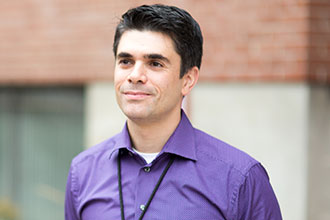Clinical Ethicists: They work amongst us but what do they do?

By Arlene Howells

Dr. Michael
Szego
Clinical ethicists help people approach, appraise, and address complex moral issues within healthcare. They provide
support to answer critical, ethical questions of care whether in the hospital or community, boardroom or bedside.
The Centre for Clinical Ethics (CCE), based out of Unity Health Toronto, was established in 1982 to meet the ethics
needs of three Catholic hospitals in the GTA: Providence Healthcare, St. Joseph’s Health Centre and St. Michael’s Hospital. Today there is a team of six clinical ethicists and two fellows working as part of hospital care teams from Hamilton to Oshawa. The CCE team has inter-disciplinary experts with backgrounds in mental health nursing to philosophy and so much more. Their multicultural team brings a wide breadth of expertise to their work. They help others navigate ethical questions: they are not the moral police.
Team members are embedded in organizations, and provide consultative services to patients, families, hospital staff,
volunteers, and students on a wide range of ethical issues. Such issues include value conflicts around decisions such as
withholding or withdrawing treatment, consent and capacity, resource allocation, and organizational ethics. The CCE’s
work is done through education, case consultations, policy development, and research.
Like everyone everywhere, their world changed amidst COVID-19.
How the work of an Ethicist makes a difference in care
A majority of their consultations pre-pandemic focused on person-centred care, seeking the best ethical outcome for a
given patient in their particular circumstance. Then the system sharply shifted to respond on a population health level.
Clinical Ethicists quickly pivoted from doing many beside consultations to more boardroom consultations. Dr. Michael
Szego, Director of the Centre for Clinical Ethics said that, “The population health lens is a vastly different way of thinking. We had to focus on stewardship and how are we going to deliver equitable support and services and make sure that we’re benefiting the highest number of people.”
While guided by efforts during SARS, and the early emerging decisions of the province, the team worked tirelessly to
develop and modify ethical frameworks to respond to urgent ethical questions. While the government and Ontario
Health were coordinating a provincial effort, local decisions had to be made quickly and tools were required for ethical
decision making to ensure fairness and transparency. Fortunately, there were tools that were already available or readily adaptable to the current situation. What was not there was created, working collaboratively with other hospitals
and clinical leaders.
In one partner site, Scarborough Health Network, tools and templates were developed with clinical leaders to address
the issues related to COVID-19 in late January. They were early out of the gate in watching what was happening around
the world and preparing for what seemed inevitable. Working collaboratively, a visitor policy, return to work policy for
staff, patient safety policy for those who required onsite treatments and PPE distribution policy were all developed.
They were then shared with other CCE partner sites to help them adapt and leapfrog into action as quickly as possible.
Dr. Szego notes, “our work in Scarborough provided some valuable content for an initial draft of the framework we
then adopted for Unity Health. They provided us a helpful starting point. We were able to leverage the team to create
tools, and then use them in multiple organizations.”
Working with partner sites, the CCE ethicists have been actively involved in:
- Advocating for marginalized and vulnerable populations to ensure they are treated fairly and equitably by raising the issue of housing supports for homeless COVID-19 patients so that they do not return to a shelter and put everyone at risk;
- Raising awareness of equity issues in care, particularly around the needs of people of colour or indigenous peoples;
- Adding their voices to committees developing policies to support triage, visitation, mental health and social isolation impact, mental health for care providers; and,
- Developing frameworks for restarting clinical services.
Looking ahead
The work they contributed to over the past few months (and years) has set a solid foundation to help organizations
prepare should a second wave hit. As they look ahead, they consider that there is room for other voices to be added to
the pandemic discussion: that of patients, family members and caregivers. They hope that both their work and the
system overall will bring additional voices to the table.
About St. Michael’s Hospital
St. Michael’s Hospital provides compassionate care to all who enter its doors. The hospital also provides outstanding medical education to future health care professionals in more than 27 academic disciplines. Critical care and trauma, heart disease, neurosurgery, diabetes, cancer care, care of the homeless and global health are among the Hospital’s recognized areas of expertise. Through the Keenan Research Centre and the Li Ka Shing International Healthcare Education Centre, which make up the Li Ka Shing Knowledge Institute, research and education at St. Michael’s Hospital are recognized and make an impact around the world. Founded in 1892, the hospital is fully affiliated with the University of Toronto.
About Unity Health Toronto
Unity Health Toronto, comprised of Providence Healthcare, St. Joseph’s Health Centre and St. Michael’s Hospital, works to advance the health of everyone in our urban communities and beyond. Our health network serves patients, residents and clients across the full spectrum of care, spanning primary care, secondary community care, tertiary and quaternary care services to post-acute through rehabilitation, palliative care and long-term care, while investing in world-class research and education. For more information, visit www.unityhealth.to.
